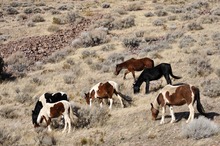More than 11,000 citizens have joined the American Wild Horse Preservation Campaign (AWHPC), Wild Horse Education, and Return to Freedom in expressing outrage over the U.S. Forest Serviceâs (USFSâs) proposal to use tax dollars to round up 1,200 tribal horses from public lands surrounding the Fort McDermitt Paiute-Shoshone Reservation and federally-protected wild horse habitat on the Nevada/Oregon border.

Free roaming Nevada mustangs
11,000 Citizens Join Wild Horse Advocacy Groups in Opposition to Taxpayer Funded Operation to Capture Tribal Horses in Nevada.
© 2015 by Carien Schippers
The USFS plans to turn the trespass horses over to the tribe, which will sell them for slaughter.
The public comments were submitted by yesterdayâs midnight deadline in response to a scoping notice regarding environmental review of the massive roundup plan, which the USFS wants to begin in August 2015.
This move comes two years after a highly controversial roundup in the same area that involved a federal Temporary Restraining Order, which blocked the sale of 149 captured unbranded horses at a slaughter auction in Nevada. The USFS withdrew from that roundup amidst intense public scrutiny; the tribe continued with the operation on its own.
âThis federal roundup of tribal horses contradicts the Obama Administrationâs policy against horse slaughter,â said Suzanne Roy, AWHPC Director. â80 percent of Americans oppose horse slaughter.
This federal plan to spend tax dollars to roundup tribal horses for slaughter is provoking public outrage, as evidenced by the more than 11,000 citizens who have submitted comments in opposition.â
"Trespass is trespass. The tribes need to be held accountable, not rewarded by a taxpayer-funded roundup that delivers trespass horses into their hands for sale for slaughter. This just places additional funds into the offendersâ pockets through the abhorrent practice of horse slaughter,â said Laura Leigh, President of Wild Horse Education.
âFederally protected wild horses in the neighboring Owyhee Complex are clearly at risk of being snared in the helicopter roundup operations. Simply approving a removal is not a plan that will create any accountability in the future.â
The horses at issue have been in trespass on the public lands for years. The capture zone includes 720,000 acres of tribal, USFS, and Bureau of Land Management (BLM) land and extends to the border of the BLMâs Little Owyhee Herd Management Area (HMA), where federally protected wild horses reside.
"The on-going cycle of mismanagement and exploitation of taxpayer dollars to round up and pipeline Reservation horses to slaughter, has to stop We cannot allow sloppy management practices to replace an ethically sustainable management plan for the Fort McDermitt Paiute-Shoshone horses and livestock", said Neda DeMayo, President of Return to Freedom.
In their comments, the advocacy groups objected to numerous aspects of the plan including:
- Use of tax dollars to round up tribal horses for slaughter.
- Lack of credible assurance that federally protected wild horses will not be snared in the roundup.
- Lack of any environmental analysis whatsoever by the BLM, despite the fact that the agencyâs lands comprise the majority of the âhorse removal area.â
- Location of trap sites only on tribal land, which will preclude public observation of the roundup and force horses to be stampeded by helicopter for 30 miles.
- Intent to avoid proper environmental analysis by issuing a Categorical Exclusion from the National Environmental Policy Act (NEPA). The action to stampede horses with helicopters through a huge public lands area, 86 percent of which is critical sage grouse habitat, requires an Environmental Impact Statement.
- Failure to take adequate enforcement action and hold the tribe accountable for decades of illegal grazing on public lands.
- Failure to take adequate steps to ensure that horses do not keep leaving the reservation, a situation that will result in an endless cycle of roundups.
The groups are urging the USFS to adopt an alternative plan to incrementally remove horses via bait trapping and work with bona fide rescue groups for the placement of unbranded horses. They also want the government to avoid capturing horses in the area adjacent to the Little Owyhee HMA.
The American Wild Horse Preservation Campaign, founded in 2004 by Return to Freedom, is a coalition of more than 60 organizations dedicated to preserving the American wild horse in viable, free-roaming herds for generations to come.
Wild Horse Education is a wild horse advocacy organization that works on the range and in the courtroom to protect wild horses and burros and reform federal wild horse management policy.
Return to Freedom is a national wild horse conservation organization that provides a safe haven to over 370 wild horses and burros at its sanctuaries in California and advocates for the redirection of funds from costly and traumatic roundups -to- viable solutions to manage wild horses and burros on their ranges.
